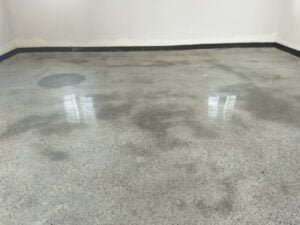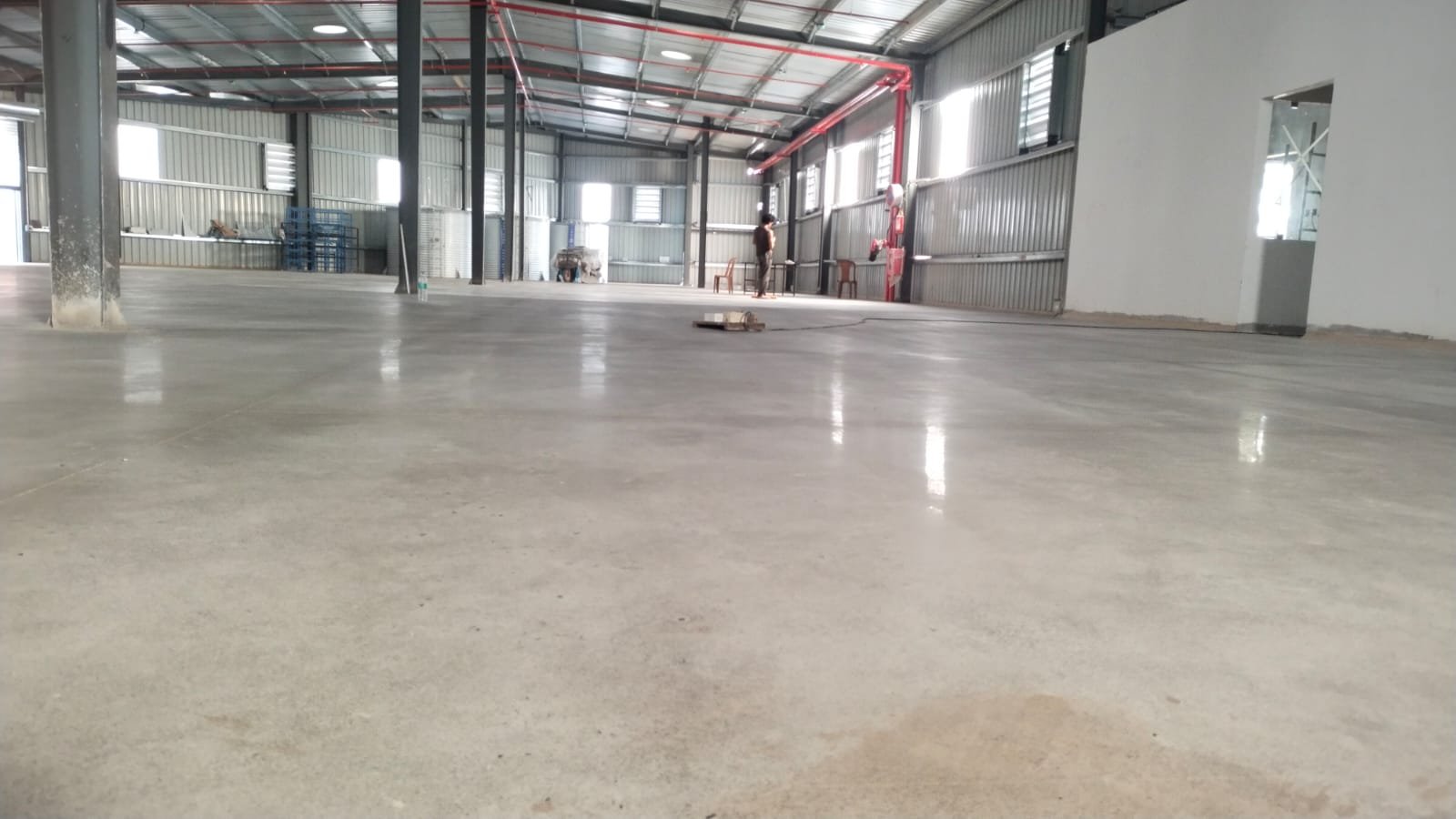INDUSTRIAL CONCRETE FLOORING
INTRODUCTION
Concrete flooring is one of the most common types of flooring used in both in residential, Commercial as well as Industrial buildings owing to its non-absorbent nature and thus it is very useful for water stores, durability, smooth and pleasing in appearance, good wearing properties, easy maintenance and is economical.
When it comes to choosing the best industrial flooring for your industrial facility, there are numerous factors to consider. Is it better to replace the entire floor and start fresh or to restore the existing floor? What design options are available, and are they customizable? How much downtime will there be for my staff between surface preparation, application, and returning to the work floor? What safety issues need to be addressed by the new floor coating? The process seems daunting, but it doesn’t need to be. As experts in industrial concrete floor solutions, Creative Maintenance Solutions, we has all the answers you need.
Commercial / Industrial (C/I) floors can be built on grade or can be suspended. Suspended floors are often built on metal decking, which is corrugated sheet metal supported by structural steel. Achieving high flatness and levelness values on these floors can be difficult since the decks and frames deflect under the weight of the concrete.
Concrete flooring, whether used in a residential basement, a big-box store or a manufacturing plant, are basically the same. Below are the popular applications:
CONCRETE FLOORING SPECIFICATIONS FOR WAREHOUSES & INDUSTRIAL BUILDINGS
Here are some basic things that should be included in industrial flooring specifications:
- Base and subbase materials—the preparation requirements should be specified along with the location of a vapor retarder.
- Concrete thickness—the designer determines the thickness based on the subbase and the anticipated loads; this is one of the primary design decisions
- Concrete compressive strength, flexural strength, or both
- Concrete Grade, Concrete mixture proportion requirements including what materials are to be used, water-cement ratio(w/cm), slump, and any allowable admixtures
- Reinforcement—the type and location of reinforcement should be specified, including how it is to be positioned during construction; remember that for slabs on grade or slabs on metal deck, the reinforcement’s purpose is only for controlling crack width
- Surface treatment—if more durable surfaces are needed, the designer will specify mineral or metallic surface hardeners
- Surface finish—with commercial or industrial floors, a hard troweled surface is the most common finish but beware of air entrained concrete, when hard troweling can lead to delaminated surfaces
- Aggregate exposure—with polished concrete there are different levels of sheen and exposure, ranging from flat to high shine, and salt and pepper to large aggregate
- Tolerances—tolerances are typically specified by referring to ACI 117, Standard Specification for Tolerances for Concrete Construction and Materials, this includes tolerances for the subbase, the slab thickness, and surface finish including FFand FLrequirements
- Concrete curing—the specification may include curing requirements, including how to respond to hot or cold weather conditions
- Joint filling—material and installation techniques if joints are to be filled.
CONCRETE FLOORS MEET THE HIGHEST FLOORING REQUIREMENTS
- Support operational and stationary loads without cracking or deforming
- Minimize the number of exposed joints
- Utilize maintenance isolation joints that do not impede vehicle operating speed
- Provide a durable abrasion resistant and dust-free surface
- Appropriate levelness and flatness tolerances to support material handling systems (“MHE”)
- Balance surface texture traction with cleanability
- Provide a safe and pleasant working environment
- Are flexible to accommodate possible future changes in operations
THE PROBLEMS WITH NORMAL CONCRETE FLOORS
Normal, or “plain” concrete, no matter how “good” it is, has several deficiencies in its properties as a structural material for industrial floors. All plain concrete;-
- Dusts, shrinks, cracks, chips and spalls
- Corrodes, stains, gets wet, transmits damp and moisture, harbours bacteria and germs
- Requires joints, in effect, “breaking” up a floor into smaller pieces. The joints become another, separate, on-going problem altogether (chipping, dusting, erosion, cleaning, etc.).
The concrete floor in any manufacturing or processing industry is the heart of the business. The uninterrupted use and serviceability of that concrete floor for production are vital to the profitability of the enterprise. In many industrial environments, the concrete floor is subjected to aggressive (mechanical) or corrosive (chemical) processes or materials, that damage the floor. This damage costs the owner large sums in maintenance or replacement, and reduced productivity. For the owner, a far worse expense is the cost in repair-downtime of the floor, with attendant loss of production and worse, loss of customers!
The Best Types of Industrial Flooring
Industrial Concrete Flooring
Industrial concrete flooring is the most widely-used concrete flooring solution around the world. It is commonly used in road construction, designing multi-story car parks and walkways. It is also known to be exceptionally durable and able to withstand constant pressure. Industrial concrete flooring can either be built on grade or suspended. Suspended floors are typically built on metal decking, which is corrugated sheet metal supported by structural steel.
Polished Concrete Flooring 
Known for its smart appearance and exceptional durability, polished concrete flooring is increasing in popularity. This flooring is commonly seen in art galleries, restaurants and other commercial properties. However, due to its versatility and design options (such as acid staining), it is now being used in residential properties. With its durability and smart finish, polished concrete flooring is becoming a very popular alternative to other flooring options such as carpet and hardwood.
Commercial Concrete
Commercial concrete is traditionally used to line commercial properties such as restaurants, department stores, and warehouses. It is a low-maintenance and hard-wearing surface which is highly customizable. Commercial concrete flooring will include slip-resistant aggregate and you can also choose to customize certain design elements, such as including decals or acid staining.
Residential and Domestic Concrete Flooring
Residential and domestic concrete flooring (RADC) can be installed in any domestic or residential properties. From plain concrete and coloured concrete, to ground and exposed aggregate concrete, RADC is a strong choice for any property.
Rubber Flooring
Rubber flooring, unlike other industrial flooring options, does not use concrete in its creation. Rubber flooring is widely used because of its comfortable and adaptable surface. Its versatility means it is a suitable flooring option for most properties. It is also slip, fire and water-resistant. Unlike most concrete flooring options, however, rubber matting usually requires more maintenance and cleaning. It is also not as hard-wearing as concrete.
Epoxy Flooring or PU Flooring
Another popular choice for industrial workplaces, epoxy flooring or PU flooring is commonly selected due to its durability and versatility. Epoxy flooring or PU flooring is different to epoxy floor coating, in that epoxy flooring is made from a number of strong epoxy, as opposed to just one layer. This means that it’s able to withstand constant, heavy traffic. It is also easy to clean and maintain, making it ideal for all properties.
Vinyl Flooring
Vinyl flooring is a fairly new type of flooring which is now mass-produced across the globe. It is a great option for those on a budget, as it is incredibly cost-efficient. It is also slip-resistant, very easy to maintain and comfortable underfoot.
Choosing the type of industrial flooring for your property depends on a number of factors, practicality, cost and appearance being the most important. Texel Agency provides you the clear Concrete Flooring Solutions it will helps you make the right choice for your property. Please do not hesitate to contact our team today for more information on the appropriate flooring for your property.
Concrete Flooring Uses:
Concrete flooring is the most used substrate in any part of world or any building. Here we have mentioned the popular usage of concrete flooring,
- Warehouse Flooring

- Car Garage flooring
- Basement car parking Deck
- Auditorium Flooring
- Convention Hall Flooring
- Educational Institute Flooring
- Manufacturing Industry flooring
- Any showroom flooring
- Hospitals and pharamaceutical industry
- Food and beverage industry flooring.
We at Texel Agency will help you to achieve best in class Industrial Concrete Flooring. We do help you to lay Industrial Concrete Flooring and all Epoxy flooring, PU flooring & concrete polishing
Texel agency is one of the best Industrial Concrete flooring & Concrete Polishing contractors in Coimbatore. Our Industrial Concrete flooring price is very optimum with best quality.
Texel Agency is also one of the best epoxy flooring applicators in Coimbatore. Our Epoxy flooring service is being extended to all over south india.
Our Epoxy Flooring service is being given in important cities like Coimbatore, Chennai, Bangalore, Hosur, Madurai, Thiruvananthapuram, Kochi & Calicut. Our Epoxy flooring service is being given at very optimum price.
Please call us for the best Industrial flooring solution,






